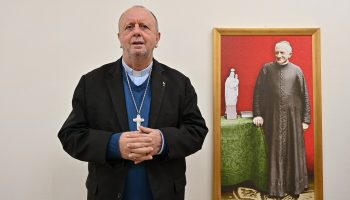
Brazil will host the United Nations Climate Change Conference (COP30). In November, the eyes of the world will turn to Belém, in the heart of the Amazon, facing the urgent challenge of making commitments that match the severity of the socio-environmental crisis.
By Jaime C. Patias *
In addressing climate justice, leaders will have to discuss peace with the Earth and with peoples at the same time, aware that ecocide and genocide are parts of the same crisis. “Without climate justice there is no peace; without ecological conversion there is no future; without listening to peoples there are no real solutions.”
We interviewed Father Dario Bossi, a member of the Churches and Mining Network, of the Special Commission of the National Conference of Bishops of Brazil (CNBB) for Mining and Integral Ecology, and an advisor to the Pan-Amazonian Ecclesial Network (REPAM-Brazil)—Catholic Church organizations committed to caring for our common home. The Comboni missionary will participate in COP30 and, together with several members of the “Priests Against Genocide” network, aims to give voice to the cry of the Earth and the poor, to the victims of ecocide/genocide, in order to raise public awareness and demand environmental justice.

Father Dario Bossi, what does “integral ecology” mean in practice for communities affected by environmental degradation or war?
We are living through a single socio-environmental crisis, with common causes behind both injustice and the degradation of creation and humanity. We are immersed in a system based on a destructive cycle of “extract, consume, and discard,” where labor and vital energy are extracted from people who are then consumed and thrown away. In the past, people sought alternative solutions, following the classic model of “let’s make the loaf grow so we can give a few crumbs to the hungry.” Now we see a system that deems it necessary to discard the “useless” and eliminate those who compete with us.
There is the same logic behind environmental violence and wars: the fact that we have reached the limits of planetary survival imposes the law of the strongest – the supposed “right” to use violence – whether through multinational corporations violating community territories or through armed conflicts destroying entire peoples.
Integral ecology, therefore, is a comprehensive response – a profound conversion from a predatory model – not just a patch or a palliative. It connects different challenges and opportunities, as the bishops of the global South affirm: “Without climate justice there is no peace; without ecological conversion there is no future; without listening to peoples there are no real solutions.”
See also the interview with Bishop Paolo Andreolli, SX, auxiliary bishop of Belém: “Gaza and the Amazon – the same cry of the Earth, the same cry of the poor.”
Concretely, we see integral ecology in action when a Latin American community resists mining activities on its land; when a group of non-violent volunteers from “Operazione Colomba” act as observers in war zones; or when a religious sister refuses to abandon her people, even under the threat of bombs.
How do you interpret the concept of “ecocide” in the context of environmental devastation in Gaza?
When a war machine is built to permanently and irreversibly destroy the living conditions of a people in a given region, what is being committed is not only genocide but also ecocide. And not only because of the direct consequences of war—bombings that destroy nature, burn, devastate, and contaminate—but also because of the explicit intent to deprive people of the basic means of subsistence: access to clean water, food, care, and health. The fundamental conditions that sustain a people are destroyed. Ecocide becomes a tool used to achieve genocide.
Can the voice of the Church, through its social teaching, help link ecological justice to human rights in war-affected regions like Gaza?
If wars are connected, then our efforts for peace must be connected as well. Conflicts among peoples are increasing in parallel with humanity’s war against nature. The UN Secretary-General, António Guterres, has said it is urgent to make peace with nature. Pope Francis speaks of reconciliation with the planet.

As we demand more and more resources – energy, minerals, and ever-deeper or more protected extraction sites – we increase the level of violence used to compete for these resources. The war against nature and the wars among peoples are intertwined. Therefore, our work for peace must unite both dimensions: peace with nature and peace among peoples.
In Latin America, we promote the alternative of post-extractivism: moving from insatiable extraction to sufficiency, and finally to what is essential. This means investing in recycling practices, reducing consumption and inequality, decentralizing and localizing production and markets. These proposals, which also have a strong basis in the Church’s social teaching, require linking political management, economic models, territorial planning, and the promotion of peace and freedom sought by communities in their own lands.

How can Catholic parishes embody the spirit of Laudato Si’ in solidarity with Gaza and other conflict regions?
The encyclical Laudato Si’ places at the heart of ecological conversion a “cultural revolution” – the ability to read reality without being trapped by the belief that our current way of life is the only or best possible model. This “cultural revolution” challenges us to envision a plural, diverse world capable of coexistence.
In practical parish life, Laudato Si’ challenges us to look beyond the daily routines we repeat out of habit or convenience. It calls us to transform the fraternity and solidarity we show toward our neighbors into universal actions that reach those who are different and distant. Laudato Si’ awakens us to the cry of the Earth and the poor, stirring indignation, keeping us restless, and reminding us that – even if we are small – we have a powerful voice to call and work for peace. It is the voice of conscience, ethics, and coherence.
* Father Jaime C. Patias, IMC, “Priests Against Genocide” Network.


